A chip competence center will begin operating in Lithuania – a national initiative aimed at strengthening the country’s position in the European semiconductor ecosystem. The center is scheduled to launch this year and will operate on a “one-stop shop” principle, combining the infrastructure and competencies of four partners: FTMC, Vilnius University (VU), VILNIUS TECH, and Kaunas University of Technology (KTU).
The portal “Verslo žinios” writes about this in more detail. Read the article available to subscribers by clicking on this link.
As stated in another text, a press release, the establishment of this center gives Lithuania the potential to become a leader in high technology. The center’s goal is to promote the growth of the semiconductor industry, help businesses, startups, and scientific institutions implement advanced semiconductor technologies, create innovations and high-value jobs, and attract investment.
Dr. Gediminas Račiukaitis, head of the Laser Technology Department at FTMC and coordinator of this project, says that the establishment of the competence center is a strategic step that will help integrate Lithuania into the European chip ecosystem.
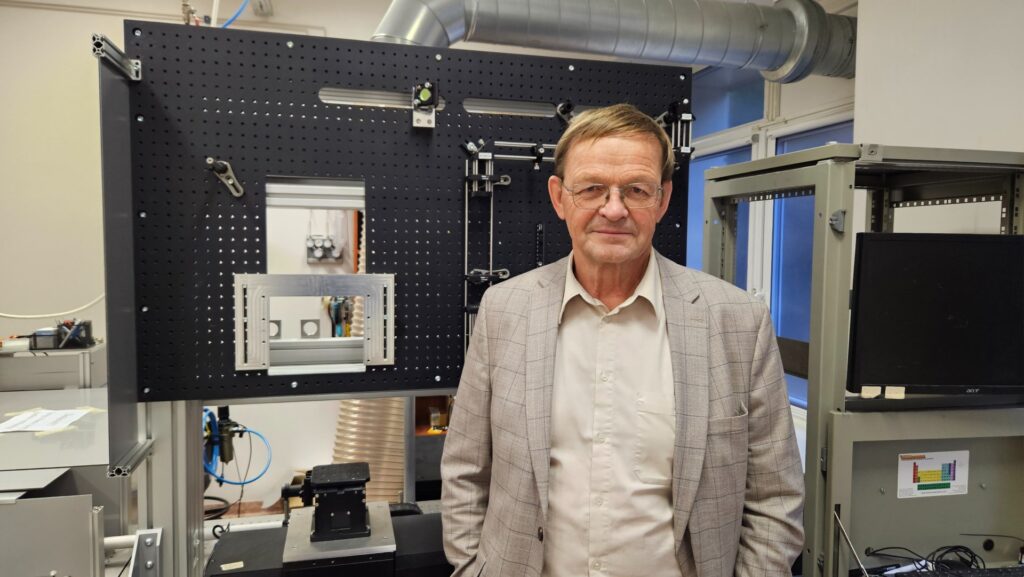
(Dr. Gediminas Račiukaitis. Photo by FTMC)
“We see that the semiconductor and electronics sector is growing rapidly worldwide, increasing its importance for technological progress and national independence, so it is important to exploit Lithuania’s potential in specialized but promising areas. By coordinating the resources of all four institutions, we will be able to offer businesses exceptional services and expertise in one place,” says the scientist.
The centre’s activities will start in 2025 with funding from the EU and Lithuania. It will act as a virtual platform where each partner will provide services according to their specialization, and FTMC will ensure the overall coordination of the center. This will enable high-quality services to local companies and, with access to large European pilot lines, to use state-of-the-art semiconductor technologies for new company products.
Dr. Saulius Tumėnas, head of the ChipsC2-LT project, which will become the Lithuanian Chip Competence Centre, says that the aim of the centre is to offer all the help needed by businesses in one place – from chip design to prototype testing, regardless of which institution has specific equipment or expertise.
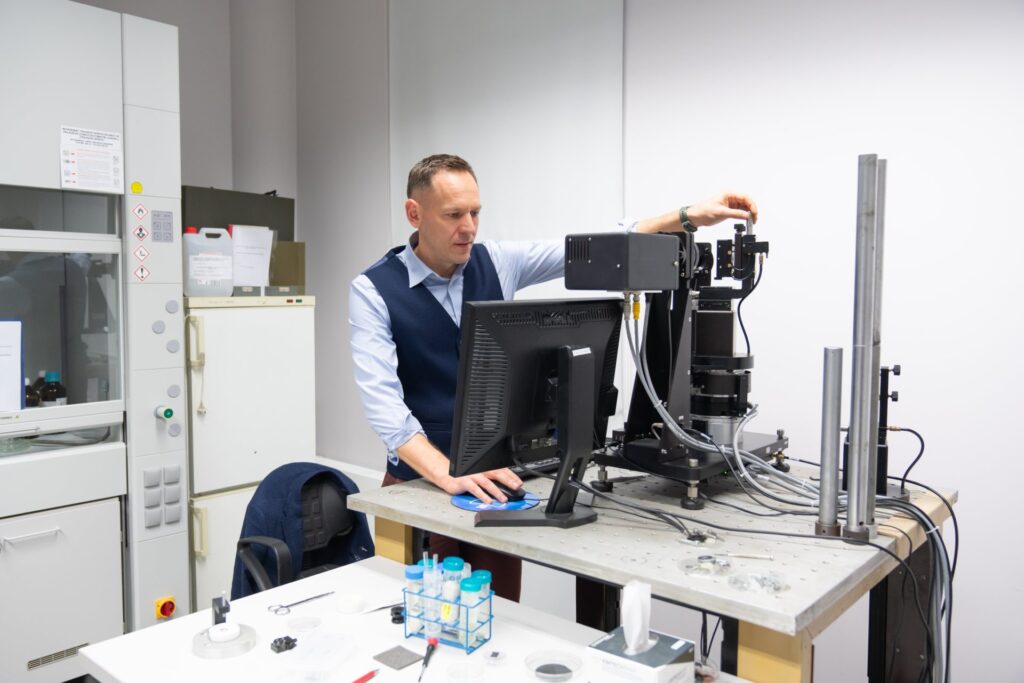
(Dr. Saulius Tumėnas. Hernandez & Sorokina / FTMC photo)
“The most important thing for businesses is to get a high-quality and fast service, not to take care of where the infrastructure is physically needed. Such a concept will allow to effectively use the strengths of all partners, avoid duplication and bureaucratic obstacles,” he emphasizes.
Strengthening partnerships
According to G. Račiukaitis, one of the most important tasks of the center is to help Lithuanian companies integrate into the European semiconductor value chains:
“We see great opportunities in specialized areas – photonic integrated circuits, terahertz technologies, advanced heterogeneous integration solutions. Lithuanian companies have the potential to create high-value-added products, and the centre will help them to enter the market faster, establish the necessary contacts and receive technological assistance.”
The researchers say that there will be no shortage of partnerships – all four partners who establish it have already established contacts with business. FTMC cooperates with companies in the Lithuanian laser and photonics ecosystem, including Light Conversion, Ekspla, Litilit, Akoneer, Altechna R&D, and Femtika.
“We are also developing relationships with South Korean, Taiwanese and US companies in the fields of semiconductor material processing and advanced heterogeneous chip integration. These partnerships will be important in expanding the Centre’s international partnerships. We are developing laser technologies that are applied in the semiconductor and electronics industry all over the world, and we hope to implement these technologies in Lithuania as well,” says G. Račiukaitis.
KTU already provides electromagnetic compatibility (EMC) testing services to companies such as Brolis Sensor, Continental, Deeper, Elinta, Kitron or Teltonika.
“Our strategic direction is chips for industry. KTU is the only institution in Lithuania that has a certified electromagnetic compatibility laboratory, which allows testing of electronic components in accordance with EU requirements. By participating in the center’s activities, we will be able to further expand these services and connect additional testing capabilities. By creating an international centre, we will be able to integrate into international research infrastructures, cooperate with international companies, carry out their outsourced research, participate in the EU programme Horizon Europe, NATO’s Science for Peace, NineSigma’s Open Innovation Network and other programmes,” says Prof. Mindaugas Žilys, Dean of the Faculty of Electrical and Electronics at KTU.
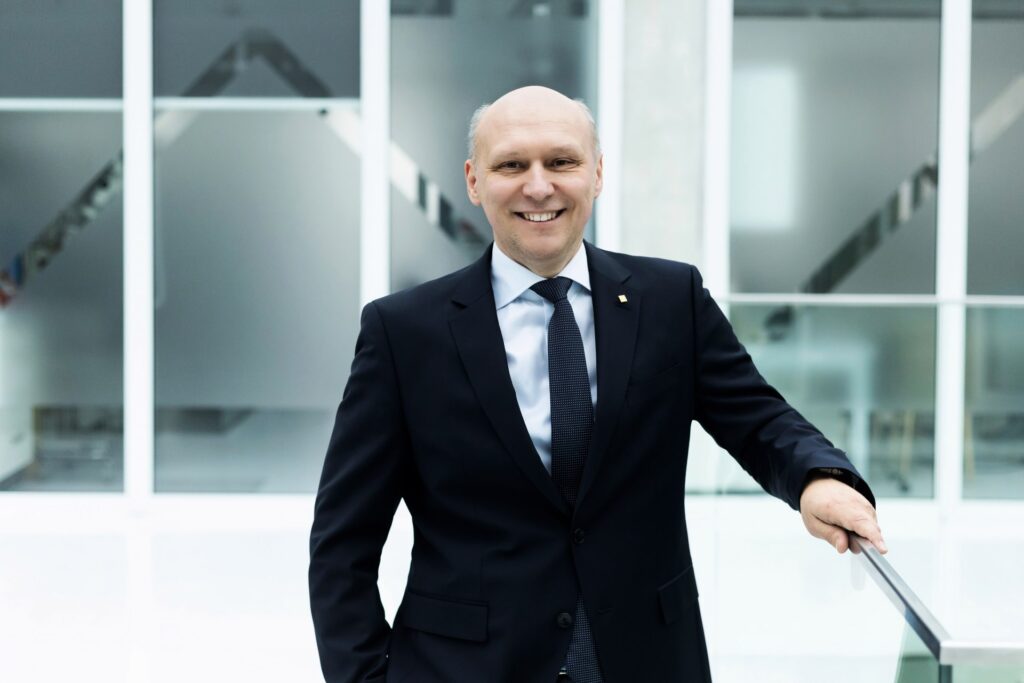
(Prof. Mindaugas Žilys. Photo by KTU)
VILNIUS TECH actively cooperates with Lime Microsystems in the development of multi-band, multi-standard wireless mobile transmitters-receivers. He also works with Teltonika IoT Group and helps the company implement semiconductor chip design and manufacturing initiatives in Lithuania.
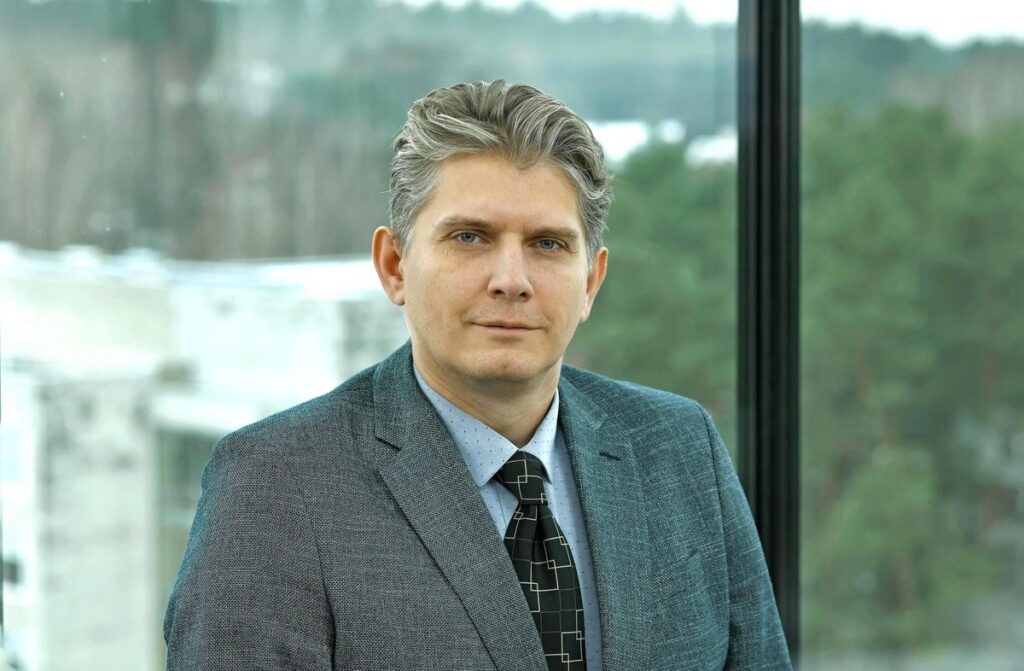
(Prof. Vaidotas Barzdėnas. Photo by VILNIUS TECH)
“With the changing market trends, we notice an increasing demand for chip design services, so we plan to strengthen this area even more,” says Prof. Vaidotas Barzdėnas, Head of the Department of Computing and Communication Technologies at VILNIUS TECH.
Prof. Ramūnas Aleksiejūnas, Director of the Institute of Photonics and Nanotechnology at the Faculty of Physics of Vilnius University, adds that VU is already participating in CERN cooperation programmes, where university scientists contribute to the development of radiation-resistant electronics:
“We also have close ties with Taiwanese universities in the field of semiconductors. Thanks to the Centre of Excellence, we will further expand international cooperation and involve Lithuanian companies.”
More specialists will be trained
R. Aleksiejūnas says that the Centre of Excellence will also be able to contribute to solving the problem of the shortage of specialists.
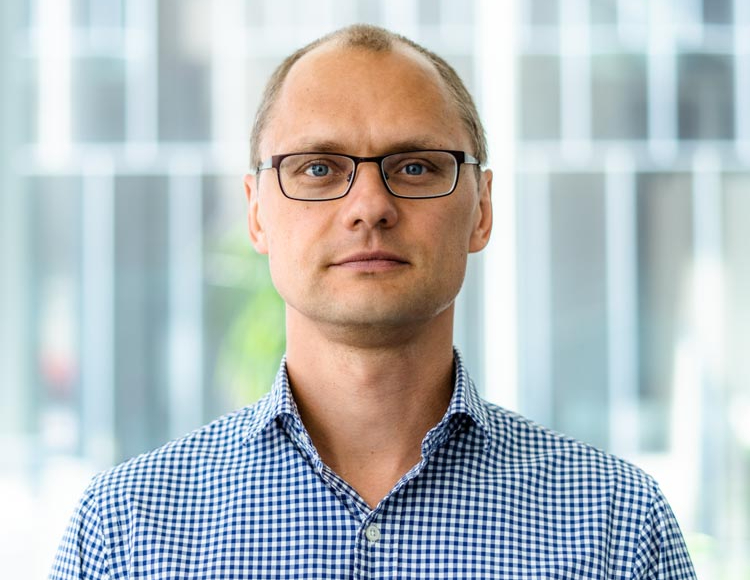
(Prof. Ramūnas Aleksiejūnas. Photo by Vilnius University)
“The Centre will help to reorient and update study programmes so that they are more in line with the needs of the market, and will provide opportunities for students and researchers to use the modern infrastructure necessary for research and innovation,” says the VU professor.
V. Barzdėnas agrees that one of the most important goals of VILNIUS TECH is to update study programmes in such a way that they correspond to the latest trends in the semiconductor sector.
“VILNIUS TECH is already training chip design specialists, but with the help of the centre, we will be able to expand this activity even further, include new modules on GaN technologies, power electronics and other relevant areas. We aim to double the number of students interested in semiconductor technologies in the next few years,” emphasizes the professor.
He says that VILNIUS TECH University is a member of the ATHENA consortium of six European universities, which offers a joint master’s program in embedded intelligent nanosystems engineering.
“We plan to develop a comprehensive package of chip design digital learning resources that include analog/mixed-signal and digital circuits. These resources will be available not only to students, but also to employees of companies seeking to acquire or update their knowledge of chip design,” says V. Barzdėnas.
VU plans to develop a new master’s program “Semiconductor Physics, Machining and Engineering” in cooperation with Taiwanese universities. VILNIUS TECH and KTU will update their bachelor’s and master’s programmes and create about 50 new and updated study courses.
“The analysis of electronics companies conducted by KTU has shown that currently about 2,000 specialists who are familiar with industrial equipment, industrial production processes and materials of semiconductor production are needed to design, manufacture, assemble and test chips, and this need will only grow,” says M. Žilys.
According to the interlocutor, close cooperation with companies will ensure that graduates have career opportunities in Lithuania.
“One of the main strategies for retaining talent is to create close cooperation between academia and business. Such an approach will not only promote research and innovation, but will also strengthen the role of the centre in developing talents and improving their practical skills,” assures M. Žilys.
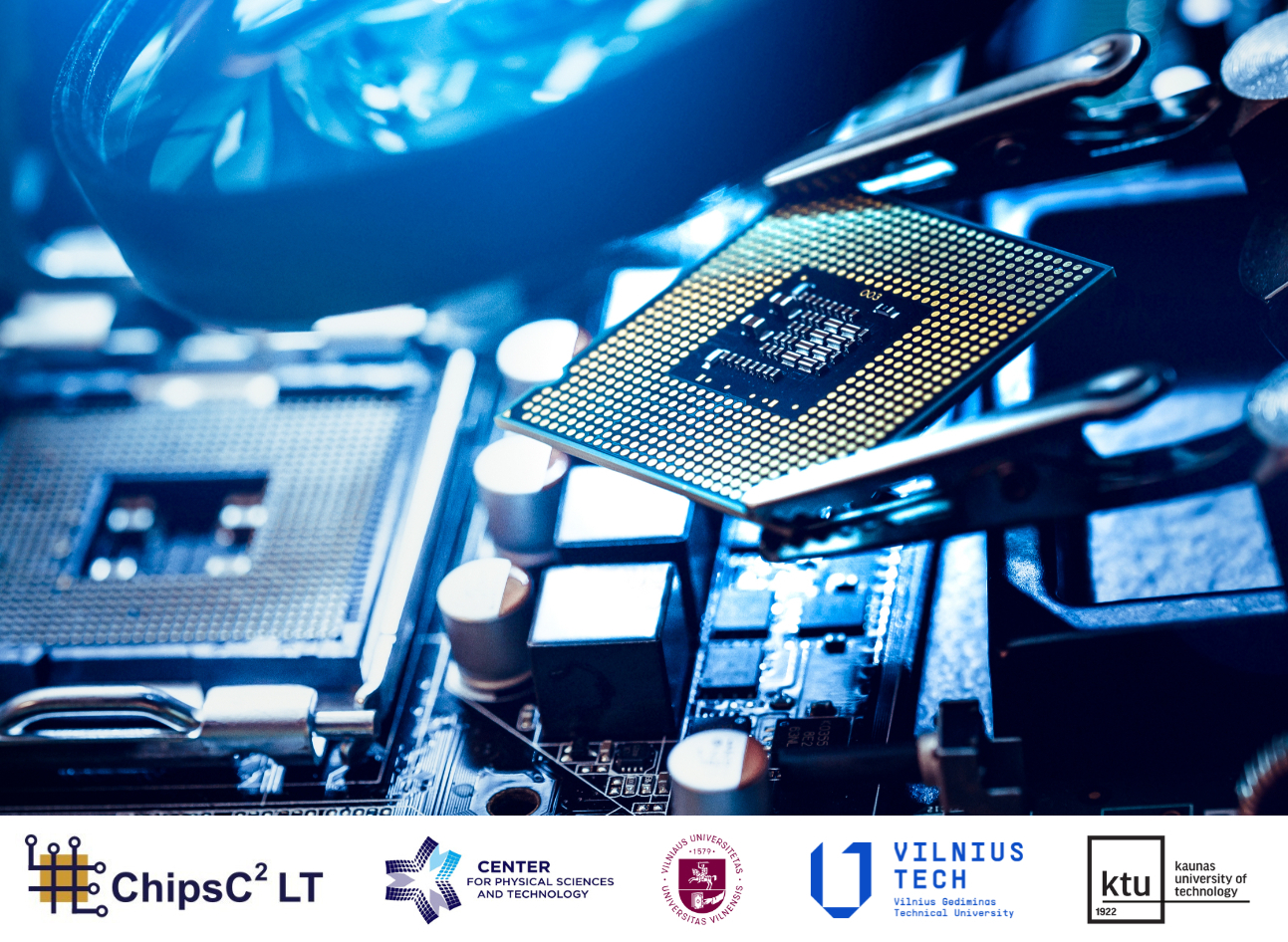
An opportunity to unleash the country’s potential
Scientists agree that Lithuania has the potential to become a strong player in specialized semiconductor fields, especially broadband semiconductors, power electronics, THz technologies and photonic integrated circuits. In addition, the country already has a strong laser and photonics sector, which can be exploited to develop innovative chip integration solutions.
“Our researchers publish articles in top-level journals and collaborate with recognized universities around the world. Now the most important thing is to use this potential effectively by creating innovative products. We see a lot of opportunities in specialized areas, such as terahertz technologies, broadband semiconductors for power electronics or photonic integrated circuits, where competition is less and the added value is very high,” emphasizes R. Aleksiejūnas.
G. Račiukaitis says that the competence centre will help to discover new specializations and strengthen existing competencies.
“Within five years, we will aim to serve at least 50 companies, initiate at least 10 new start-ups in the field of semiconductors and help businesses attract significant investments to the sector. However, the most important thing is to create a sustainable ecosystem that could grow and develop independently, attracting talent and investment from all over the world,” the scientist names the priorities.
Vilniustech.lt information

